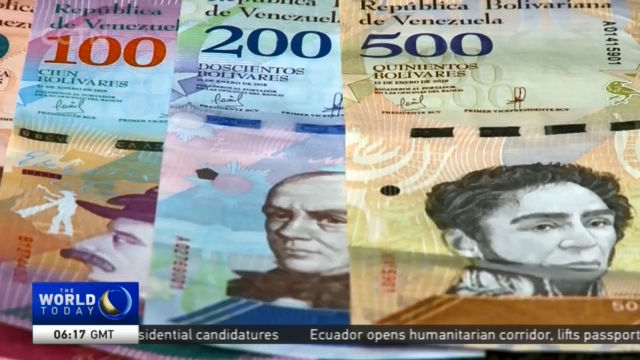
15:09, 25-Aug-2018
Venezuela Economic Crisis: Residents and government search for ways to cope with hyperinflation
Updated
14:33, 28-Aug-2018
03:08

This week, thousands of businesses closed as Venezuela launched a new currency. The new banknotes are aimed at curbing hyperinflation in a country where prices, on average, are doubling every 26 days. CGTN's Juan Carlos Lamas tells us how people are coping with sky-rocketing costs.
Six years ago, Ana Cedeno found out she had breast cancer. The diagnosis forced her to quit her job of 30 years as a social worker.
Now, amid rampant inflation, her pension combined with her husband's salary, comes to less than two U.S. dollars a month.
ANA CEDENO SOCIAL WORKER "We eat and survive because we've been selling personal items to buy protein like eggs, and that's it."
Like many in crisis-stricken Venezuela, Cedeno struggles to feed her family amid soaring prices and shortages. While some have taken to eating spoiled meat, Ana boils dirty water to cook with and drink.
ANA CEDENO SOCIAL WORKER "Once I have nothing left to sell, I don't know what we'll do. Maybe I'll become a street merchant, or start selling lemonade or something."
Each month, Cedeno's family gets a government subsidized food box. But she says the rice, oil and flour are not enough to feed her family of four.
JUAN CARLOS LAMAS CARACAS "Venezuelan President Nicolas Maduro blames the crisis on what he calls 'imperialist forces' waging an economic war on Venezuela. In addition to issuing new banknotes, the government has announced a three-thousand percent increase in the minimum wage due to take effect on September first, along with higher corporate taxes."
But the IMF predicts Venezuela's economy will shrink by 18 percent this year, and inflation could still hit a million percent.
LUIS VICENTE LEON ECONOMIST "Erasing zeroes from the notes does not solve the problem which led you to take them out. If the government doesn't control the hyperinflation, three months from now, the new notes will be worthless."
Shopping for her family at a street market in Caracas, Ana Cedeno has doubts that runaway inflation will ease.
ANA CEDENO SOCIAL WORKER "Two bananas and seven tomatoes, this is the food I could buy with my salary for the next month. In Venezuela, there's no education, no medicine, the list goes on. This is tough. Each day is a constant battle to continue living."
In the meantime, Cedeno is unable to get proper treatment for her cancer. And as the crisis continues to roil the country, she says she's considering joining two million of her fellow Venezuelans that the U.N. says have fled the country in recent years. Juan Carlos Lamas, CGTN, Caracas.

SITEMAP
Copyright © 2018 CGTN. Beijing ICP prepared NO.16065310-3
Copyright © 2018 CGTN. Beijing ICP prepared NO.16065310-3